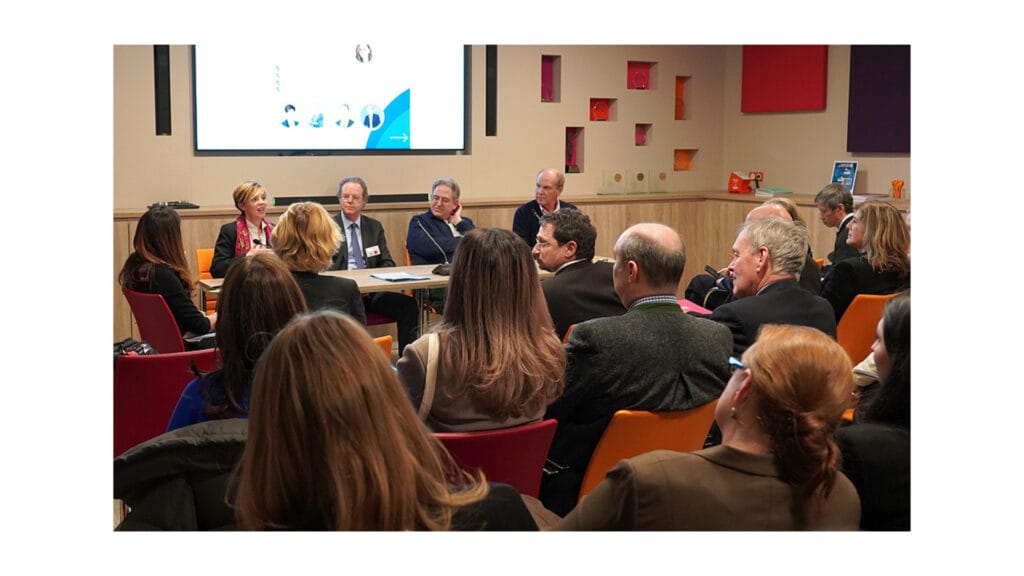A Reflection of February’s Cocktail Discussion with Mediators, YMI Members and users of ADR in Paris, France
Introduction
With the deadline for professional applications to the highly anticipated 19th International Chamber of Commerce (ICC) Commercial Mediation Competition approaching this Friday, November 10, 2023, we are excited to make a save the date announcement as part of ICC’s largest educational event – mark your calendars for the International Mediation Institute (IMI) 2024 ICC Mediation Week Event scheduled for February 6, 2024!
We use this opportunity to reminisce about IMI’s event – the “International Commercial Mediation Cocktail Discussion” on February 8, 2023, as part of ICC’s Mediation Week – hosted by the esteemed De Gaulle Fleurance & Associés law firm in the heart of Paris, France.
“Our ability as lawyers to overcome challenges is what makes life interesting. Today, we are facing challenges in the world of mediation. I am convinced, however, that the opportunities by far outweigh the risks, and I have no doubt that this will come to light during the panel discussions.”
Pierrick Le Goff, Chair of the IMI Board, delivering the welcome address.
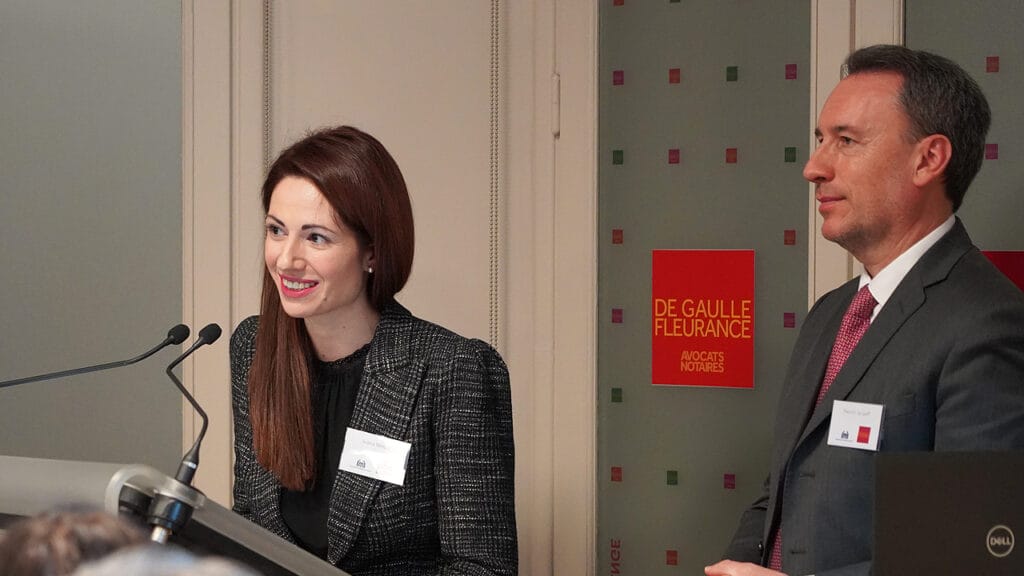
The event brought together a diverse audience, including IMI Certified and Qualified Mediators, members of the Young Mediators Initiative, local users from the Greater Paris Area, and strong supporters of the IMI. The event agenda included three thought-provoking panel discussions followed by a vibrant networking session.
“The mediation process is as diverse as the various mediators that practice it, so putting a face to the process is all the more important. We had the pleasure of hearing from eight IMI Certified Mediators, and a member of the Young Mediators’ Initiative (YMI) – to showcase the excellence in the field. Equally important were the reflections and experiences shared by the users of mediation, which will guide our further work.”
Ivana Ninčić Österle, IMI Executive Director
Panel I: Mediation and Arbitration – Cooperation or Competition?
The first panel, entitled “Mediation and Arbitration – Cooperation or Competition?”, was moderated by Samantha Nataf, seasoned dispute resolution lawyer and firm Partner at De Gaulle Fleurance and Associes, and comprised of the following ensemble of distinguished speakers: Anne-Laure Gosset, VP Legal & Compliance AMECA, Middle East & Africa Alstom and Attorney-at-Law (New York Bar); Wolf Kurzel-Runtscheiner, Group General Counsel, Soletanche Bachy; Jeremy Lack, IMI Certified Mediator and Mediator Advocate, and lawyer and ADR neutral admitted to the bars of England & Wales, New York and Geneva; and Claude Amar, IMI/SIMI ICFM Certified Mediator, founder of Mediation & Resolution, and President of IFCM (Institut Français de Certification des Médiateurs).
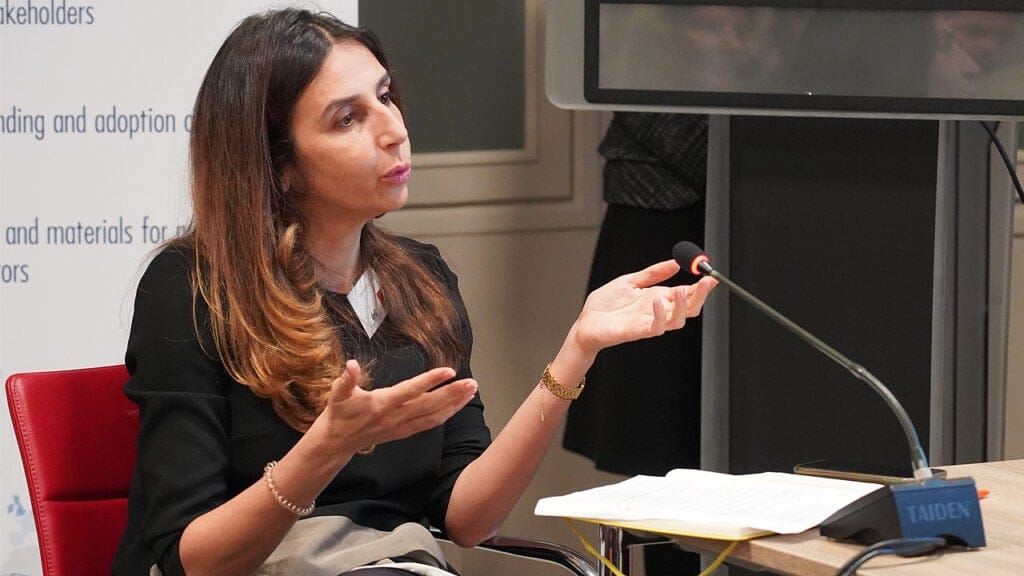
The discussion commenced with unanimous agreement among panelists that mediation and arbitration are not mutually exclusive methods. Instead, they can complement each other effectively, offering parties involved in disputes a spectrum of choices to tailor their resolution processes to specific needs. Mediation, known for its collaborative and non-adversarial nature, can often pave the way for successful arbitrations by resolving underlying issues and fostering a cooperative atmosphere between conflicting parties.
The panelists acknowledged that the business sector frequently faces protracted disputes, with arbitration being a prevalent method for resolving such conflicts. Nonetheless, they recognized the growing interest in mediation and the seismic shift in sentiment towards it.
Wolf highlighted efficacy in mediation and advocated for more wide-spread adoption of its use in business-natured disputes. Anne-Laure supplemented by emphasizing the advantages of mediation; in particular, its capacity to expedite dispute resolution and save time, in contrast to the protracted proceedings of arbitration or litigation. The panellists further touted the potential of mediation as a mechanism to significantly elevate the effectiveness of any case resolution.
“Success in an arbitration or litigation is to win or to mitigate the risk, success in mediation is to reach an agreement come to an agreement.”
Anne-Laure Gosset, Panelist
Jeremy, who was co-chair of IMI, Straus Institute and CCA’s International Mixed Mode Task Force, added another dimension, highlighting how mediation transcends disputes, breathing new life into resolutions while preserving crucial relationships.
In evaluating arbitration, conciliation, and mediation were as distinct forms of ADR and their various degrees of efficiency when used independently or combined, the panel also discussed the vital role of IMI’s Mixed Mode Task Force in using feedback from the Global Pound Conference (GPC) Series to develop model standards and criteria for combining various dispute resolution processes including public or private adjudicative systems such as arbitration and litigation with non-adjudicative methods that involve the use of a neutral such as mediation, whether in parallel, sequentially or as integrated processes.
Jeremy too emphasized the importance of collaboration between mediation and arbitration to prevent unwarranted delays in the administration of justice.
“Delayed justice is justice denied.”
Jeremy Lack, Panelist
The panel also addressed the issue of insufficient awareness among legal professionals regarding mediation. Wolf noted that in evaluating ‘cooperation versus competition’, the two are incomparable, and collaborative efforts can exist in both arbitration and mediation. The discussion underscored the crucial role of professionals, such as lawyers, arbitrators, and mediators, in guiding parties toward informed decisions, providing comprehensive guidance on the pros and cons of each method and fostering cooperation between mediation and arbitration processes.
Claude introduced an innovative concept during the event – the “GREAT Process: Guaranteed Resolution on Effective and Adapted Terms.” This novel hybrid dispute resolution process offers companies a way to manage their significant disputes by tailoring the resolution process to their unique needs, resources, and the complexity of the situation. Most importantly, it provides an enforceable resolution by a predetermined date, assuring companies that their dispute will not hinder current and future projects. Read more here.
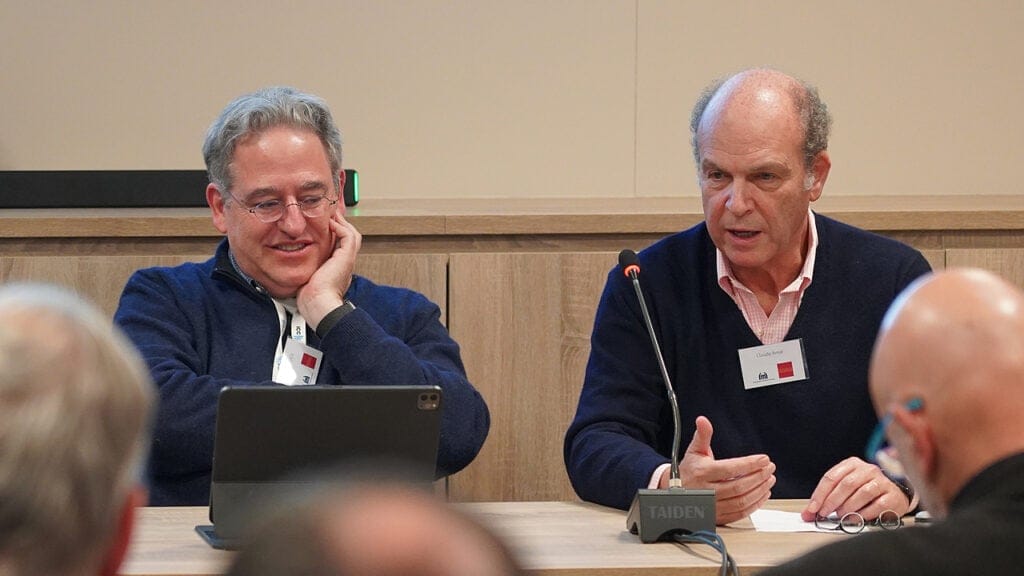
The panel’s engaging discussion shed light on the intricate relationship between these two dispute resolution mechanisms, and underscored that while occasional competition exists, experts and users concur that cooperation and synergy between mediation and arbitration offer the most promising path forward. Parties seeking resolution must be aware of the nuances of each method and consider adopting hybrid processes when appropriate, ensuring a collaborative and effective approach to dispute resolution in various contexts.
The takeaways from the panel included the important notion that as the legal landscape continues to evolve, understanding the cooperative potential between mediation and arbitration will remain essential for professionals and parties alike, shaping the future of alternative dispute resolution practices.
Panel II: Contemporary Issues in International Commercial Mediation Practice
The second panel “Contemporary Issues in International Commercial Mediation Practice”, was moderated by Tat Lim, an IMI Certified Mediator and Mediation Advocate and the newest addition to IMI’s Board of Directors upon nomination by the Singapore Mediation Center (SMC), a foundational provider of IMI. Joining the conversation were luminaries in the mediation field: Michel Kallipetis, IMI Certified Mediator practicing barrister and King’s Counsel, with over 15 years’ experience as a sitting Deputy High Court Judge as well as the UK’s representative at the UNCITRAL Working Group II, integral to the drafting of the Singapore Convention; Catherine Davidson, IMI and SIMI Certified Mediator practicing in Australia and internationally with a diverse portfolio of expertise in a multitude of commercial and workplace disputes; and Jody Sin, IMI Certified Mediator and a seasoned dispute resolution lawyer from Hong Kong, amassing over two decades of experience in mediating diverse commercial fields.
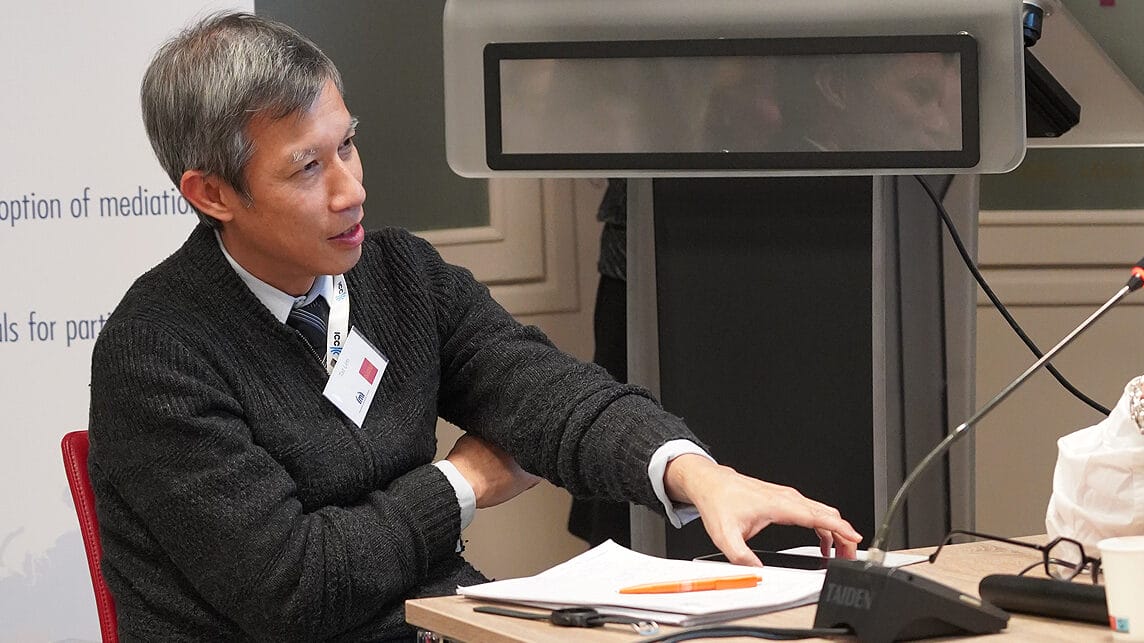
One of the pivotal themes of the discussion revolved around the enforceability of mediation agreements and the implications of the Singapore Convention. Michel shared his insightful thoughts on this matter, shedding light on the evolving landscape of mediation agreements and their global enforceability.
The Singapore Convention on Mediation, formally known as the United Nations Convention on International Settlement Agreements Resulting from Mediation, is an international treaty that aims to facilitate the enforcement of mediated settlement agreements in cross-border commercial disputes. Michel observed that the success of the Convention is evident in its acceptance by a substantial number of countries, and underscores its significance in creating a unified framework for the enforcement of mediated settlements globally.
In examining the multifaceted aspects of the Singapore Convention, Michel not only recognized its global embrace but also delved into the fine legal points that define its functionality. Particularly, the legal dimensions of Article 5, which places the burden of proof squarely on the party seeking to resile from a settlement agreement, was indicated to be an emphasis of the careful calibration of responsibilities and expectations in the pursuit of fair and effective dispute resolution. Michel highlighted that the Convention emerges as a cornerstone in fostering a standardized and enforceable framework for settling cross-border commercial disputes through mediation, ultimately contributing to a more cohesive and efficient global dispute resolution landscape.
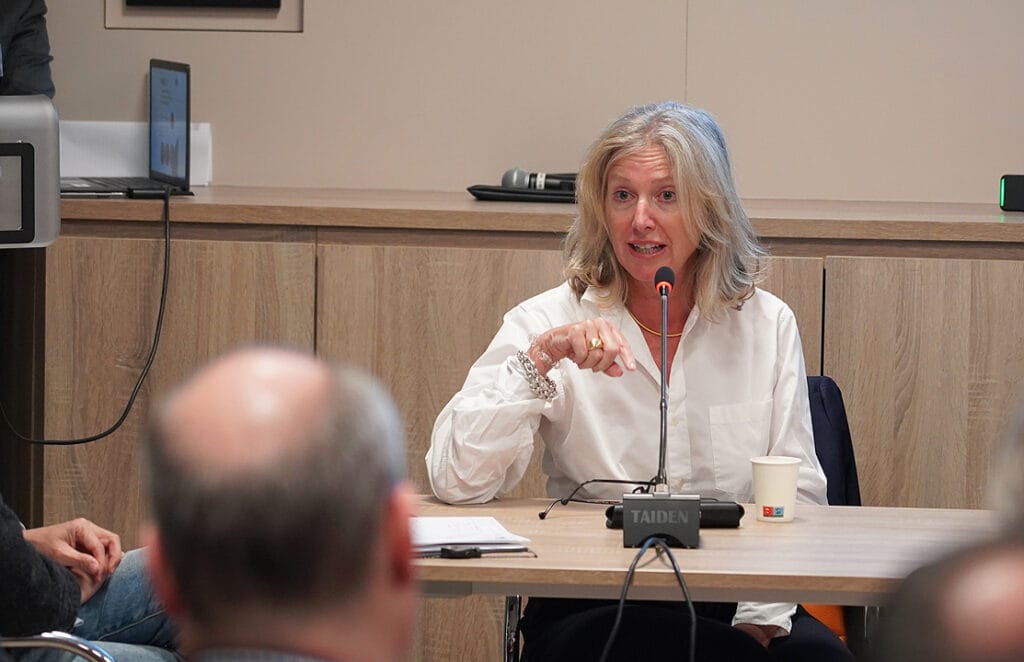
Catherine focused her discussion on mandatory or compulsory mediation, emphasizing the importance of thorough preparation for commercial mediation. In a thought-provoking analysis, she underscored the critical significance of meticulous preparation which takes on renewed importance in the era of hybrid mediation, mandatory mediation, and the evolving role of lawyers within the process.
Her perspective aligns with the evolving landscape of mediation, where the intersection of legal expertise and mediation skills is increasingly vital. Catherine’s emphasis on the growing involvement of lawyers in mediation, coupled with their training in mediation and advocacy, reflects a paradigm shift in the approach to dispute resolution. As mandatory and hybrid mediation models become more prevalent, Catherine’s commentary encourages practitioners to adapt, emphasizing that effective preparation is not only a fundamental element but a dynamic and evolving requirement in the contemporary mediation landscape.
“The importance of preparation for commercial mediation takes on new relevance with hybrid mediation, mandatory mediation, and the role of lawyers.“
Catherine Davidson, Panelist
Jody emphasized a pivotal transformation post-COVID 19 within the mediation process. According to her, a noteworthy shift has occurred in the utilization of diverse modes throughout the mediation journey. Drawing from her extensive experience, Jody noted that parties now frequently express varying preferences and requests regarding the format of the process—whether to conduct sessions online or in person. This choice extends beyond the main mediation session, encompassing preparatory sessions as well.
This acknowledgment underscores a tangible evolution in the dynamics of mediation, reflecting a heightened demand for flexibility and adaptability. As parties navigate the intricacies of dispute resolution in a post-pandemic landscape, their distinct preferences regarding the online or in-person facets of mediation underscore the need for a versatile and customized approach. Jody’s insights illuminate the nuanced considerations that practitioners must now navigate to ensure that mediation processes align seamlessly with the preferences and comfort levels of the involved parties. This adaptability, in response to the changing demands of the post-COVID era, stands as a testament to the resilience and innovation within the field of mediation.
Furthermore, Jody supplemented Catherine’s view on the nuanced topic of lawyers’ involvement in the mediation process, highlighting the substantial value they contribute.
“The participation of lawyers can add a lot of value to the process, especially when the substance of the case involves difficult legal issues.”
Jody Sin, Panelist
In emphasizing the value that lawyers bring to the mediation table, Jody shed light on the collaborative and synergistic nature of effective dispute resolution. This recognition underscores the evolving landscape of mediation, where the interdisciplinary collaboration of legal professionals becomes an integral component of successful dispute resolution strategies.
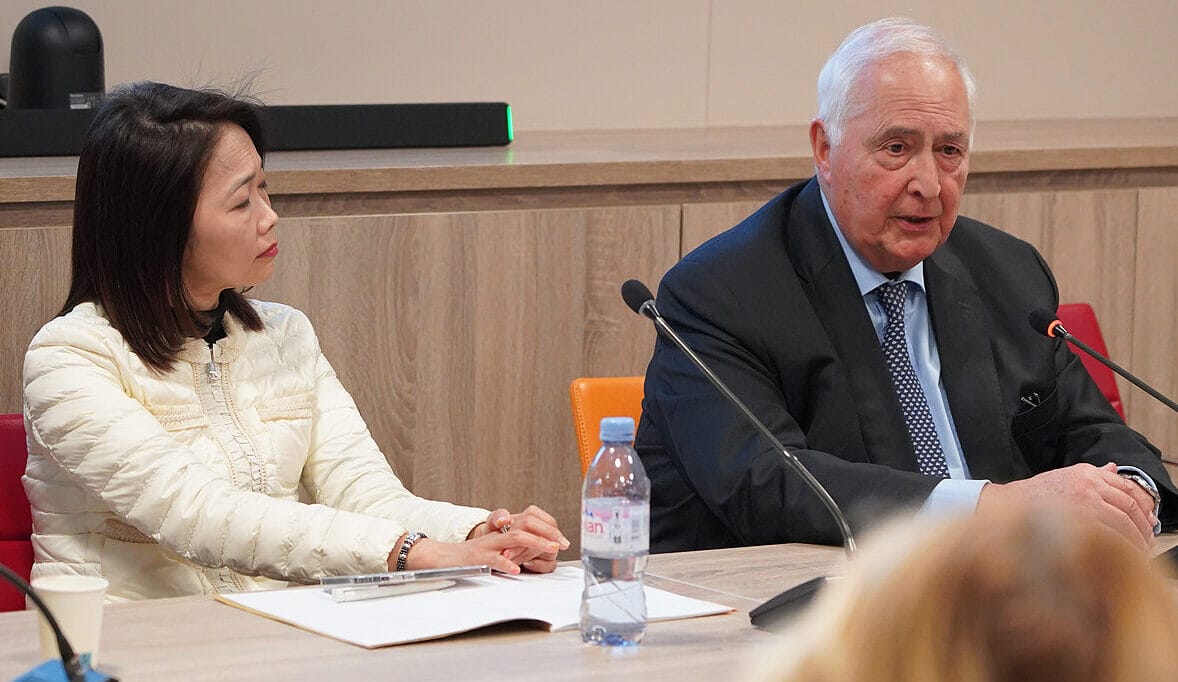
Panel III: Empowering Mediation as a Profession
Evidently, mediation as a profession is really at the heart of what IMI cares about – it is enshrined in the foundation’s vision and activities. To inspire and engage in discussions about this multi-faceted professional field, the third and final panel was entitled “Empowering Mediation as a Profession”. The panel was moderated by Angela Herberholz, a distinguished professional mediator with a decade of experience in mediating commercial and employee disputes, IMI Board Member and the co-founder of IMI’s Young Mediators’ Initiative (YMI).
The panel comprised seasoned professionals, each bringing a unique perspective to the discussion. Andrea Hartmann-Piraudeau, a qualified business mediator with over 20 years of experience and a doctorate in the field of mediation and negotiation; Bart Neervoort, a full-time mediator specializing in corporate and commercial disputes and the founding partner of e-POM, the European platform for online resolution of P2B disputes; and Christopher Olsson Lønes, SIMI Certified Mediator, YMI Member and gold award winner from international competitions in both mediation and negotiation.
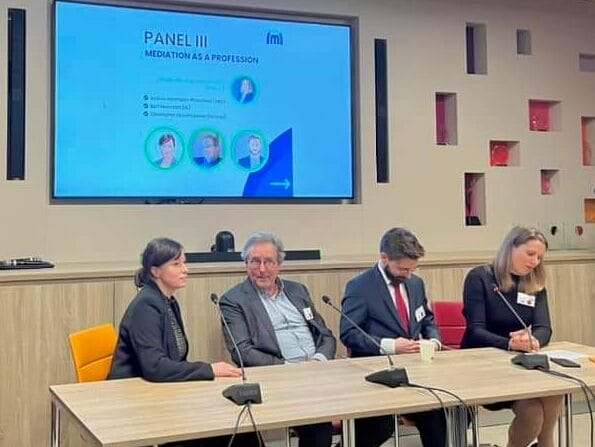
Angela, steering the discussion, emphasized the foundational role of mediator training in shaping aspiring mediators, especially as a first stepping stone for many choosing to step into the field of mediation. Recognizing this significance, Angela emphasized the need for standardized and monitored quality across these training programs. The panel identified the pivotal role played by the IMI criteria for Certified Mediator Training Programs (CMTPs) in performing this task by developing international standards established through the recommendations of IMI’s independent international task forces and worldwide stakeholder consultation.
Christopher provided valuable insights into what constitutes effective mediation training, highlighting the importance of integrating a competitive element to replicate real-life mediation experiences. By infusing a competitive dimension, the training would mirror the dynamic challenges and pressures encountered in actual mediation scenarios, ensuring that practitioners are well-prepared to navigate the complexities of the field with practical skills honed in a simulated, yet authentic, environment.
Continuing the dialogue on maintaining standards, Andrea directed attention to the diverse frameworks existing across countries for mediator qualifications. Amidst this variation, she positioned IMI’s quality criteria for IMI Qualified and IMI Certified as a unifying force, seamlessly bridging gaps and offering a cohesive standard.
“Different countries have various frameworks to be a qualified mediator and IMI quality criteria provides an overall qualification for mediators.”
Andrea Hartmann-Piraudeau, Panelist
The criteria not only acts as a benchmark but becomes a valuable guide for individuals seeking qualified mediators tailored to their specific needs. In a world of diverse practices, IMI’s criteria stand as a beacon, ensuring that individuals can navigate the global landscape of mediation with confidence, knowing they have a reliable measure of excellence.
“Being an IMI certified mediator builds a lot of trust. It’s hard to identify a good, experienced mediator. IMI certification gives the trust the parties need.”
Christopher Olsson Lønes, Panelist
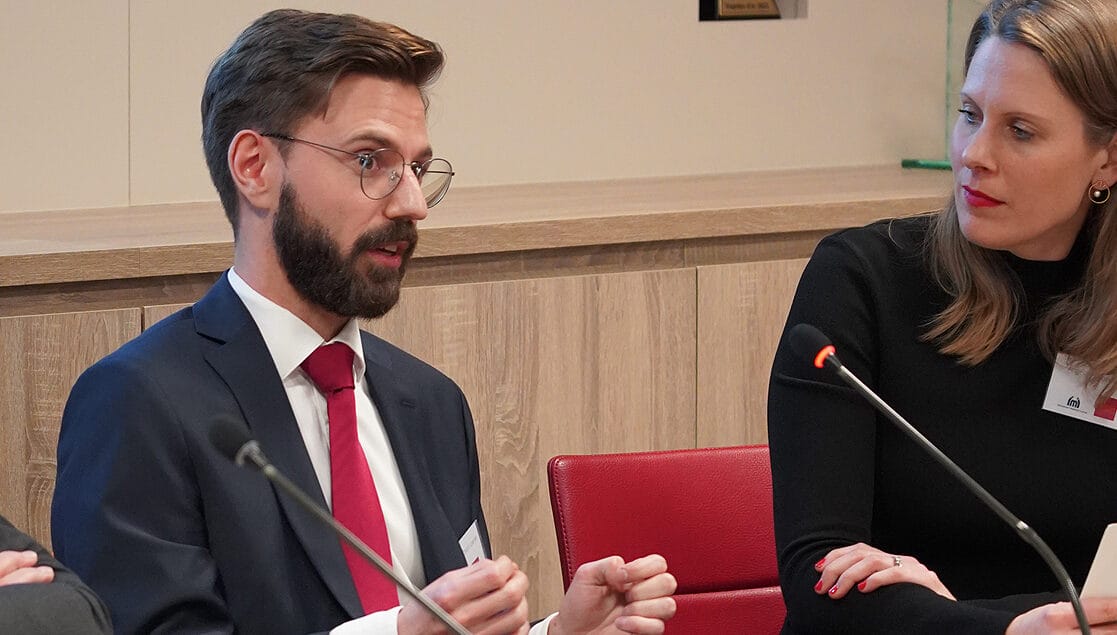
Even after attaining certification, the journey does not end; Bart emphasized upon the commitment to continuous learning is fundamental to the ever-evolving landscape of mediation. According to Bart, fostering a curious mindset is not just a professional inclination but a strategic imperative for those dedicated to advancing the practice of mediation.
“Even after being a professional mediator one should remain curious and should keep on developing one’s capabilities through training.”
Bart Neervoort, Panelist
The panel unanimously acknowledged the significance of gaining practical experience, often acquired through mentoring relationships. Mentors, as guiding lights, play a pivotal role in shaping future mediators. To facilitate this, YMI has operated for the past decade as a platform for young and experienced mediation professionals to: connect, network, share knowledge, get in touch with mediation organizations and gain field experience through shadowing, assistantships, internships, co-mediations and mentoring programmes. Learn more about YMI here.
Reflecting on their experiences, the panelists discussed potential changes in the mediation process. Andrea stressed upon the importance of fostering colleague interaction and community building, citing the IMI community as a strong example of a supportive network.
Christopher, looking towards the future, highlighted the need for increased real-life mediation practice. His perspective emphasizes the importance of hands-on experience in honing mediation skills, suggesting a practical approach to skill development and refinement.
In a similar vein, Andrea advocated for instilling trust in young mediators, drawing a parallel to the trust vested in young professionals in other fields. Her viewpoint aligns with the belief that building confidence in emerging talent is essential for the growth and sustainability of the mediation profession.
Bart offered a forward-looking vision, envisioning the next generation of mediators actively participating in increased training and advocacy efforts. His foresight extends beyond individual skill development, emphasizing a collective effort to shape a cultural shift in how mediation is perceived. By promoting a culture that values mediation and recognizes its efficacy, Bart’s vision suggests a proactive and collaborative approach to advancing the profession. In his perspective, the commitment to training and advocacy becomes a catalyst for not only individual growth but also for influencing the broader perception of mediation in society.
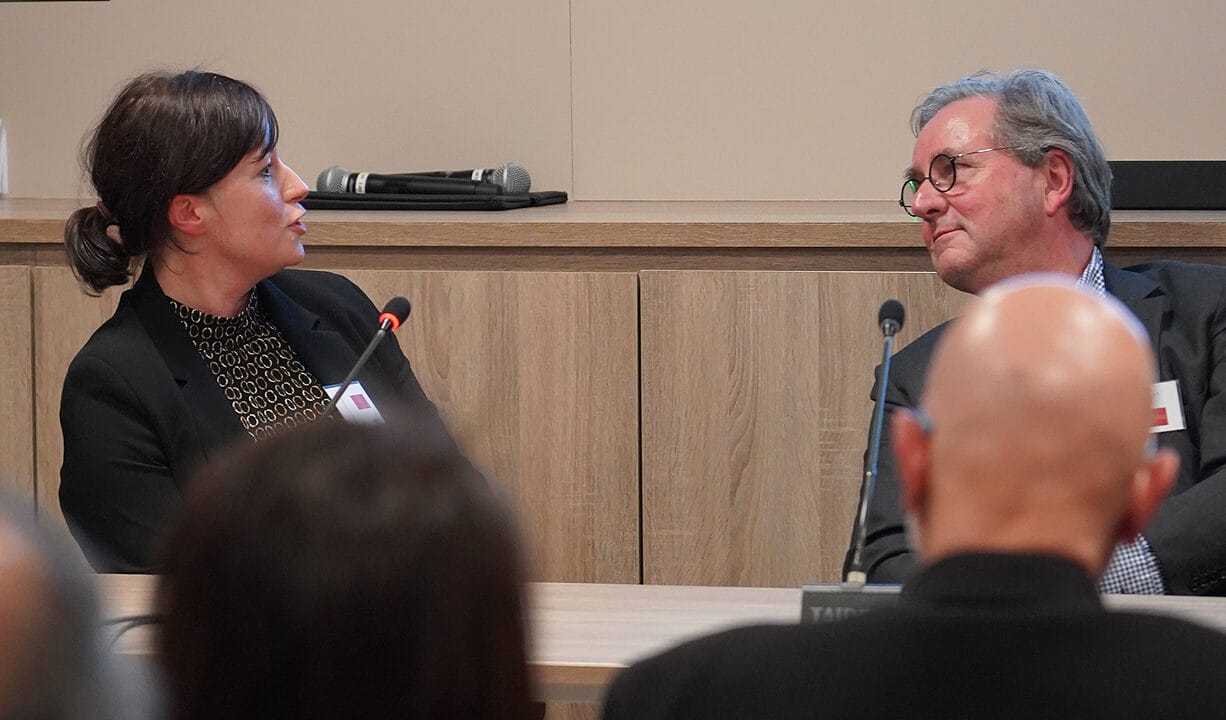
IMI ICCMW Event 2024: Save the Date!
The ICC Commercial Mediation Competition eagerly anticipates the next chapter in mediation exploration from 5th-10th February, 2024, inviting mediation enthusiasts to join the ongoing conversation, contribute their insights, and collectively shape the future of mediation as a revered profession. Sign up to be a professional for the 19th edition of the ICC Commercial Mediation Competition here.
Similarly, IMI equally anticipates your attendance – save the date for the next IMI event, taking place during ICC Mediation Week on Tuesday, February 6, 2024!
We extend our gratitude to the IMI interns for their contributions to this event summary, particularly Theshani Weligamage for her notes on Panel Discussion I: “Mediation and Arbitration – Cooperation or Competition?”, Samaa Shazuli for her notes on Panel Discussion II: “Contemporary Issues in International Commercial Mediation Practice“ and Yasara Pitawala for her notes on Panel Discussion III: Panel Discussion III : Empowering Mediation as a Profession“.


